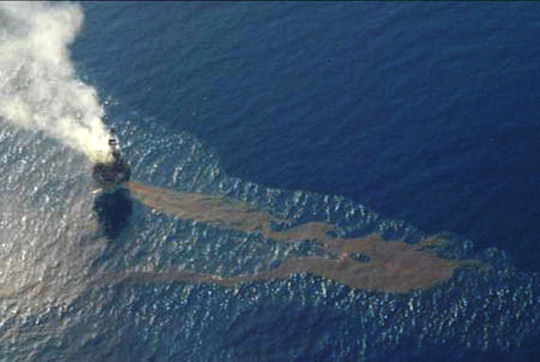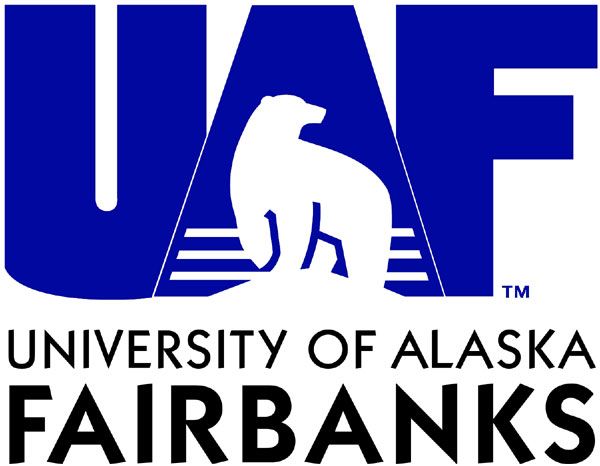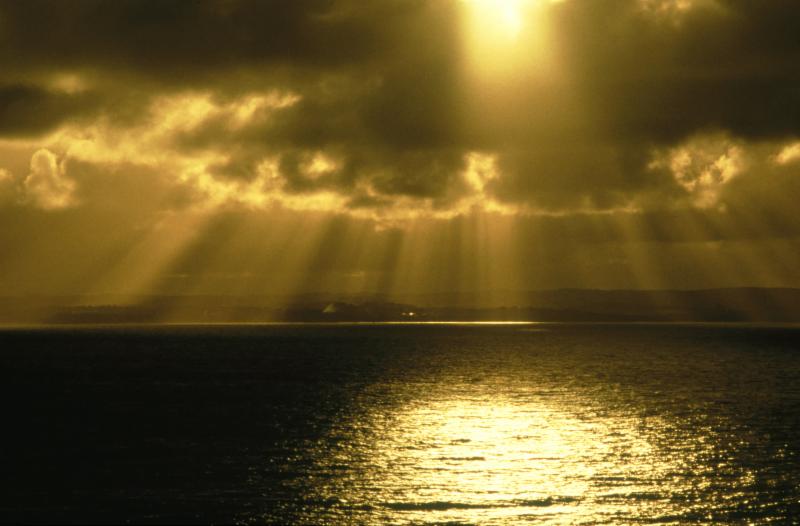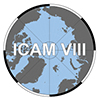|
|
|
|
|
|
|
|
The Effects of Climate Change on the World's Oceans, June 4-8, 2018 (Washington, DC USA). The 4th International Symposium will bring together experts from around the world to better understand climate impacts on ocean ecosystems - and how to respond. The event is hosted by a variety of groups including International Council for the Exploration of the Sea (ICES), N. Pacific Marine Science Organization (PICES), Intergovernmental Oceanographic Commission of UNESCO (IOC), and Food and Agriculture Organization of the United Nations (FAO). Session 16 includes Fran Ulmer, Diana Bull, Apurva Dave, Lawson Brigham, and Esther Babson, among others. 
 Coastal Response Research Center Requests Input on the State of Science on Dispersant Use in the Arctic. Coastal Response Research Center Requests Input on the State of Science on Dispersant Use in the Arctic. The Coastal Response Research Center (CRRC) recently collected statements and reports on five topic areas related to dispersant use in the Arctic: efficacy and effectiveness; physical transport and chemical behavior; degradation and fate; eco-toxicity and sublethal impacts; and, public health and food safety. CRRC request written input on the statements the scientists made on the state-of-the-science regarding dispersant use, particularly as it applies to Arctic waters. Written comments are requested by July 13th. More information on this initiative is available here.
|
Media
Robots Detect Start to Arctic's Marine 'Spring Bloom.' Researchers from the Scottish Association for Marine Science (SAMS) in Oban have been investigating the so-called Arctic spring bloom. Using robots called gliders, they measured chlorophyll, an indicator of the biological content of the water. Chlorophyll levels "rapidly increased" in mid-April. BBC News
 New UAF Research Could Help Scientists Develop an Early Warning Systems for Earthquakes. New UAF Research Could Help Scientists Develop an Early Warning Systems for Earthquakes. A University of Alaska Fairbanks researcher has discovered unusual precursor activity along the Minto Fault west of Fairbanks. UAF associate professor of geophysics Carl Tape says seismometers in the region recorded minor shaking before an earthquake. "A low, building-up process that becomes an earthquake," Tape said. Tape says that type of warning signal has never been detected anywhere else in the world. Tape says the motion and another type of pre-quake movement, were picked up on two occasions prior to moderate earthquakes. Alaska Public Media
Acoustic Detection of the Critically Endangered North Pacific Right Whale in the Northern Bering Sea. The eastern population of the North Pacific right whale is one of the most endangered baleen whale populations in the world, numbering in the tens of individuals due to historic whaling (19th and 20th centuries) followed by illegal catches in the 1960s. Whaling logs indicate that the majority of NPRW catches and sightings within the eastern Bering Sea ranged from the Aleutian Islands to St. Matthew Island, with limited detections farther north. It has been suggested that at least some of the northern range historical sightings were either misidentified as bowhead whales or were the result of transcription errors. Wiley Online Library
 Secrets of Fish Population Changes Revealed: Scientists Link Ocean Dispersal of Baby Fish and Ecology of Adults. Secrets of Fish Population Changes Revealed: Scientists Link Ocean Dispersal of Baby Fish and Ecology of Adults. Populations of fish in the ocean are notoriously variable, waxing and waning in often unpredictable ways. Knowing what drives changes in fish population sizes is important for managing fisheries and conserving species. For the first time, scientists have linked the ecology of adult fish populations inhabiting coral reefs with the dispersal of baby fish between reefs, reporting the dynamics of a living network called a 'marine metapopulation.' Science Daily
|
|
Future Events
Vision on Marine Infrastructure, June 11, 2018, 1:00-3:00 pm (Washington, DC
).
The U.S. Committee on the Marine Transportation System and its Marine Transportation System Federal partners will share their visions and priorities on maritime infrastructure, which refers to physical infrastructure, informational infrastructure (such as aids to navigation, nautical charts, and real-time meteorological and oceanographic services), and mariner needs. Open to the public, but RSVP is required. Please contact Jaya.Ghosh@cmts.gov by June 6, 2018 to RSVP. See here for additional details.
 POLAR 2018, June 15-27, 2018 (Davos, Switzerland). POLAR2018 is a joint event from the Scientific Committee on Antarctic Research (SCAR) and the International Arctic Science Committee (IASC). The SCAR meetings, the ASSW and the Open Science Conference will be hosted by the Swiss Federal Institute for Forest, Snow and Landscape Research WSL under the patronage of the Swiss Committee on Polar and High Altitude Research. The WSL Institute for Snow and Avalanche Research SLF is organizing POLAR2018. POLAR 2018, June 15-27, 2018 (Davos, Switzerland). POLAR2018 is a joint event from the Scientific Committee on Antarctic Research (SCAR) and the International Arctic Science Committee (IASC). The SCAR meetings, the ASSW and the Open Science Conference will be hosted by the Swiss Federal Institute for Forest, Snow and Landscape Research WSL under the patronage of the Swiss Committee on Polar and High Altitude Research. The WSL Institute for Snow and Avalanche Research SLF is organizing POLAR2018.
From Entering the Field to Taking the Helm, Women's Perspectives on Polar Research, June 20, 2018 (Kongresszentrum Davos, Switzerland). This event is hosted by ARCUS and co-sponsored by USARC. Research findings are shaping our understanding of the issues that women face in technical fields, particularly those with strong connections to fieldwork. Concerns include a deficit of female leadership due to the so-called "leaky pipeline," a lack of safety and inclusivity at field locations, and explorations of ways in which research agendas have discounted contributions of women. Despite historical barriers to participation in polar field work, women have made outstanding contributions to polar physical, biological and social sciences, as well as to community-level efforts to coordinate and communicate science. In the past decade, women have stepped into leadership roles at polar institutions. Yet evidence of persistent challenges, reflected both in academic studies and media reports, compels us to examine the sources of those challenges and to explore solutions to ensure a bright future for all those who wish to engage in polar research.
5th European Conference on Permafrost, June 23-July 1, 2018 (Chamonix-Mont Blanc, France). In the continuation of the International and Regional conferences convened by the International Permafrost Association, the 5th European Conference on Permafrost (EUCOP 2018) will be held in Chamonix-Mont Blanc, France, 23rd June - 1st July 2018. The conference aims at covering all relevant aspects of permafrost research, engineering and outreach on a global and regional level. Conference website: here.
Arctic Observing Summit 2018, June 24-26, 2018 (Davos, Switzerland). The Arctic Observing Summit (AOS) is a high-level biennial summit that provides a platform to address urgent and broadly recognized needs of Arctic observing across all components of the Arctic system. AOS 2018 will be held in Davos, Switzerland ( June 24-26) and will focus on pressing issues in the implementation and support of sustained observations that can be addressed through a business-case lens. To that end, short submissions are requested that address any and all aspects of the overarching theme and sub-themes. Additional information can be found here.
17th International Congress of Circumpolar Health (ICCH17), August 12-15, 2018 (Copenhagen, Denmark). The ICCH congresses are held every third year in different locations in the circumpolar area and represent the largest scientific meetings worldwide on circumpolar health. The ICCH congresses serve as the primary source of information exchange and scholarly communication in issues relating to circumpolar health. More than 750 participants generally register and participate in each Congress, and more than 400 scientific papers or posters are usually presented.
UArctic Congress 2018, September 3-7, 2018 (Oulu and Helsinki, Finland). The UArctic Congress 2018 will bring together key UArctic meetings and a science conference into one single gathering, including business meetings of the Council of UArctic, Rectors' Forum, Student Forum, and Thematic Networks & UArctic Institutes Leadership Team. The Congress is an integral part of the Finland's Arctic Council chairmanship program, and open to the public. The event will highlight the themes and priorities of the Finnish chairmanship, including the goals of the United Nations' 2030 Agenda for Sustainable Development, and the Paris Agreement under the UN Framework Convention on Climate Change.
Scientific Exploration of the Arctic and North Pacific (SEA-NorP), September 25-27, 2018 (Mt. Hood, Oregon USA). This workshop will include discussion of hypotheses that can be tested by scientific drilling in the region, the technology necessary to achieve those goals, ideal sites for drilling based on existing data, and where additional site survey data is needed. The goal of the workshop organizers is that multiple proposals will be initiated at the workshop, both for full cruise legs and for shorter, targeted expeditions around the following themes: ocean gateways, geohazards, volatile cycling, ice histories at transition zones, biosphere and climate.
The second Arctic Biodiversity Congress is hosted by the Conservation of Arctic Flora and Fauna (CAFF), the biodiversity working group of the Arctic Council, and the Ministry of the Environment, Finland. The second Arctic Biodiversity Congress will build on the success of the first Congress, held in 2014 in Trondheim, Norway, and will bring together scientists, policymakers government officials, Indigenous representatives, Traditional Knowledge holders, industry, non-governmental organizations, and others to promote the conservation and sustainable use of Arctic biodiversity.
|
|

  
4350 N. Fairfax Drive, Suite 510
Arlington, VA 22203, USA
External links in this publication, and on the USARC's World Wide Web site ( www.arctic.gov) do not constitute endorsement by the US Arctic Research Commission of external Web sites or the information, products or services contained therein. For other than authorized activities, the USARC does not exercise any editorial control over the information you may find at these locations. These links are provided consistent with the stated purpose of this newsletter and the USARC Web site.
|
|
|
|
|
|
|
|
|
 New UAF Research Could Help Scientists Develop an Early Warning Systems for Earthquakes. A University of Alaska Fairbanks researcher has discovered unusual precursor activity along the Minto Fault west of Fairbanks. UAF associate professor of geophysics Carl Tape says seismometers in the region recorded minor shaking before an earthquake. "A low, building-up process that becomes an earthquake," Tape said. Tape says that type of warning signal has never been detected anywhere else in the world. Tape says the motion and another type of pre-quake movement, were picked up on two occasions prior to moderate earthquakes. Alaska Public Media
New UAF Research Could Help Scientists Develop an Early Warning Systems for Earthquakes. A University of Alaska Fairbanks researcher has discovered unusual precursor activity along the Minto Fault west of Fairbanks. UAF associate professor of geophysics Carl Tape says seismometers in the region recorded minor shaking before an earthquake. "A low, building-up process that becomes an earthquake," Tape said. Tape says that type of warning signal has never been detected anywhere else in the world. Tape says the motion and another type of pre-quake movement, were picked up on two occasions prior to moderate earthquakes. Alaska Public Media Secrets of Fish Population Changes Revealed: Scientists Link Ocean Dispersal of Baby Fish and Ecology of Adults. Populations of fish in the ocean are notoriously variable, waxing and waning in often unpredictable ways. Knowing what drives changes in fish population sizes is important for managing fisheries and conserving species. For the first time, scientists have linked the ecology of adult fish populations inhabiting coral reefs with the dispersal of baby fish between reefs, reporting the dynamics of a living network called a 'marine metapopulation.' Science Daily
Secrets of Fish Population Changes Revealed: Scientists Link Ocean Dispersal of Baby Fish and Ecology of Adults. Populations of fish in the ocean are notoriously variable, waxing and waning in often unpredictable ways. Knowing what drives changes in fish population sizes is important for managing fisheries and conserving species. For the first time, scientists have linked the ecology of adult fish populations inhabiting coral reefs with the dispersal of baby fish between reefs, reporting the dynamics of a living network called a 'marine metapopulation.' Science Daily

 Coastal Response Research Center Requests Input on the State of Science on Dispersant Use in the Arctic. The Coastal Response Research Center (CRRC) recently collected statements and reports on five topic areas related to dispersant use in the Arctic: efficacy and effectiveness; physical transport and chemical behavior; degradation and fate; eco-toxicity and sublethal impacts; and, public health and food safety. CRRC request written input on the statements the scientists made on the state-of-the-science regarding dispersant use, particularly as it applies to Arctic waters.
Coastal Response Research Center Requests Input on the State of Science on Dispersant Use in the Arctic. The Coastal Response Research Center (CRRC) recently collected statements and reports on five topic areas related to dispersant use in the Arctic: efficacy and effectiveness; physical transport and chemical behavior; degradation and fate; eco-toxicity and sublethal impacts; and, public health and food safety. CRRC request written input on the statements the scientists made on the state-of-the-science regarding dispersant use, particularly as it applies to Arctic waters. 

